An article published in the Montenegrin newspaper “Pobjeda” on December 16, 2022, accuses the Albanian, Serbian and Montenegrin states of violating the sanctions imposed by the European Union against Russia, after the start of the war with Ukraine in February 2022. The accusations were repeated by representatives of the Albanian opposition, leading to wider distribution of information. Faktoje verified and found that the article of the Montenegrin newspaper is based on a false premise, while the argumentation of the violation of sanctions itself, unsubstantiated.
Jona Plumbi
“Belgrade and Tirana used the territory of Montenegro despite the sanctions that Podgorica has imposed on Russia.” This is the title of the exclusive article of the Montenegrin newspaper Pobjeda, which accuses the three countries of the Western Balkans, Albania, Serbia and Montenegro, of violating EU sanctions against Russia by allowing the transport of artificial fertilizers (chemical fertilizers) from Russia in Serbia.
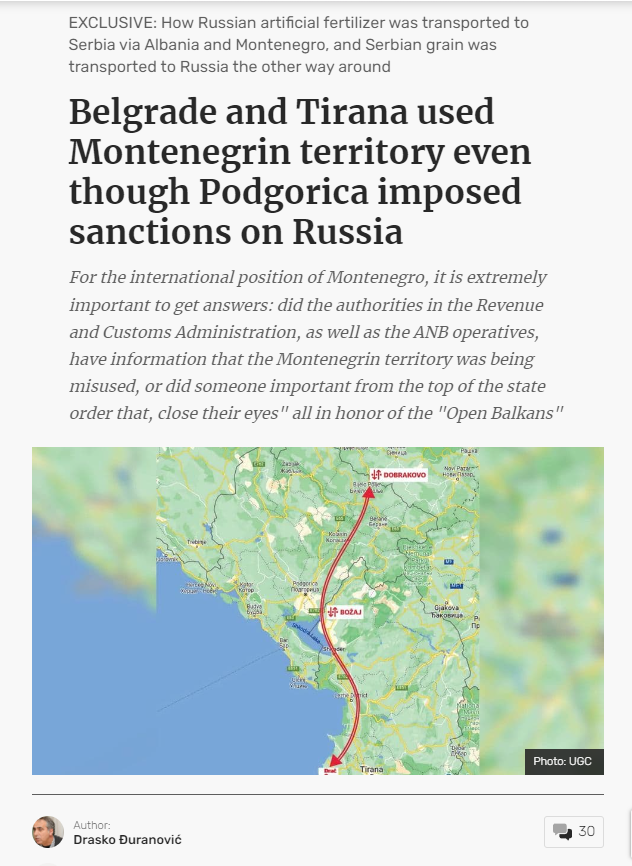
The claim
According to the Montenegrin newspaper, for more than a year, very large quantities of artificial fertilizers coming from Russia entered Albania through the Port of Durrës, to pass through Montenegro to Serbia. On the other hand, Serbia exported truckloads of grain to Russia. The newspaper quotes its “several sources” from the security sector and the customs department for this trade, which it calls “illegal”.
As proof of the illegality that was being carried out, the newspaper offers the claim that after the Montenegrin government adopted sanctions against Russia on April 8, 2022, a group of people from Russia, Albania and Serbia – owners of companies close to the authorities of these three countries – tried to hide the country of origin of this trade.
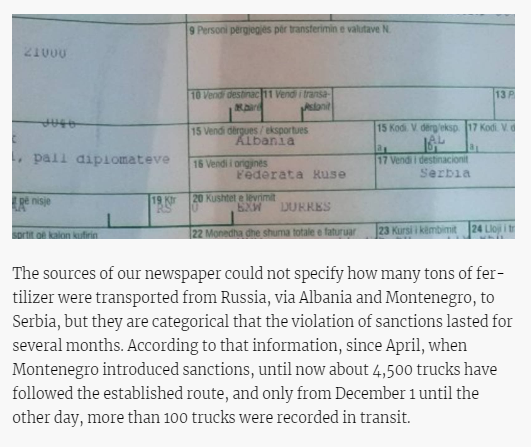
“ The sources of our newspaper could not specify how many tons of fertilizer were transported from Russia through Albania and Montenegro to Serbia, but they are categorical about the fact that the violation of sanctions lasted for months. According to this information, since April, when Montenegro adopted the sanctions, until now, about 4,500 trucks have followed this route. ” – writes the newspaper.
The “copy-paste” information echoed in Albania
The news of the Montenegrin newspaper was also redistributed in the Albanian online media, as well as received the attention of the largest opposition party in the country, which voiced the “problem” without first verifying the facts.
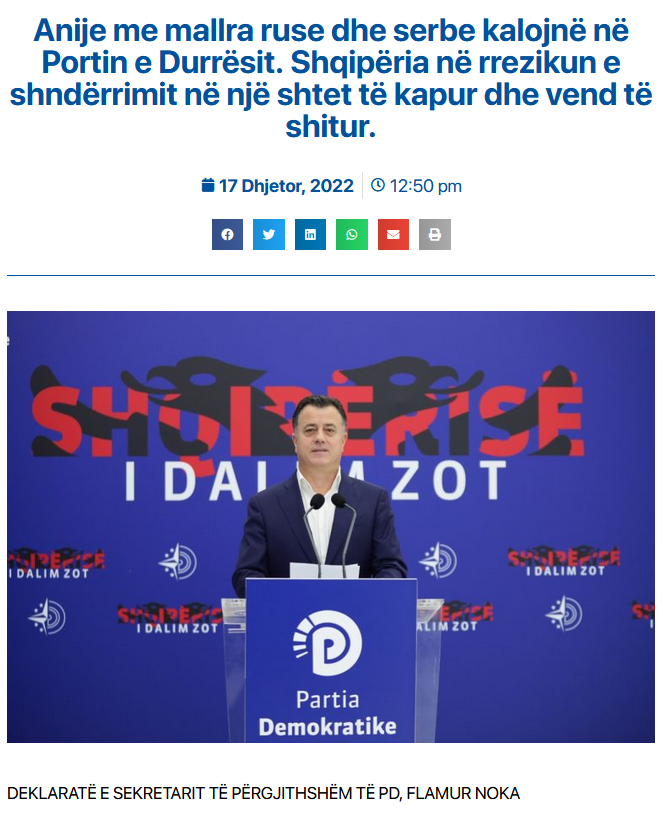
After this statement, the rate of spread of the news of the Montenegrin newspaper was multiplied by the media, traditional and online, that repeated the claim of MP Flamur Noka, without delving into its veracity, and distributed it to their followers on television, web pages or social networks.
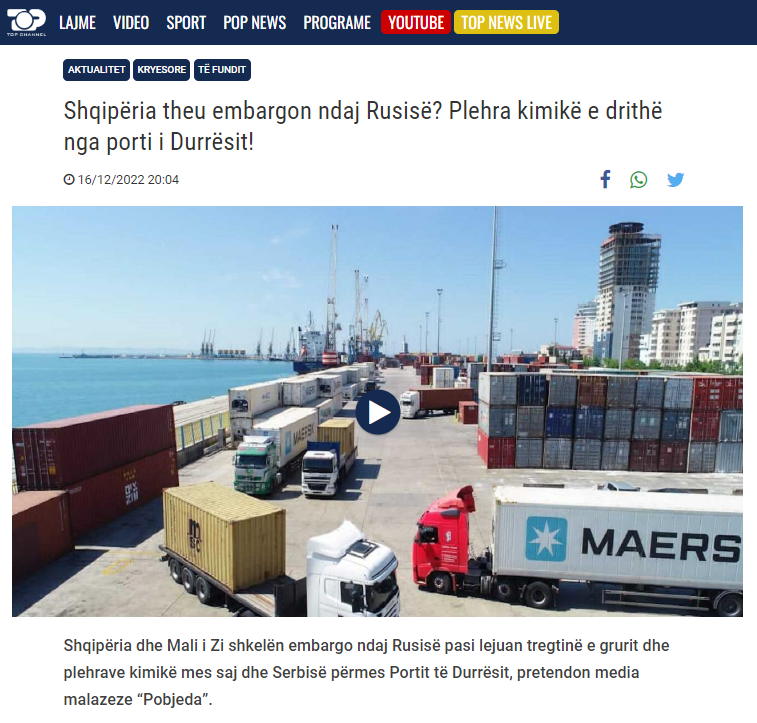
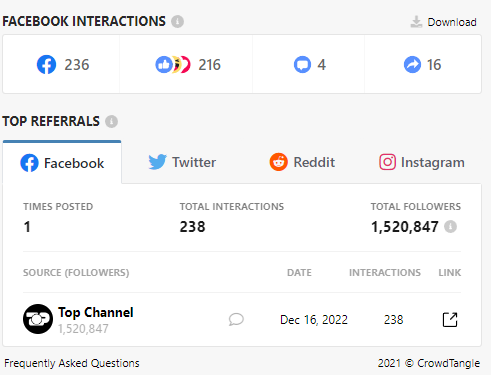
EU sanctions against Russia
The sanctions imposed by the European Union on Russia, after the start of aggression in Ukraine in February 2022, do not block exports and transactions related to food and agricultural products.
EU sanctions explicitly exclude food supplies and fertilizers: there are no sanctions on Russian food exports to global markets. Anyone can operate, buy, transport, provide food and fertilizers coming out of Russia .” – is written on the official website of the European Council, where the sanctions that the EU has imposed on Russia since the beginning of the war are explained.
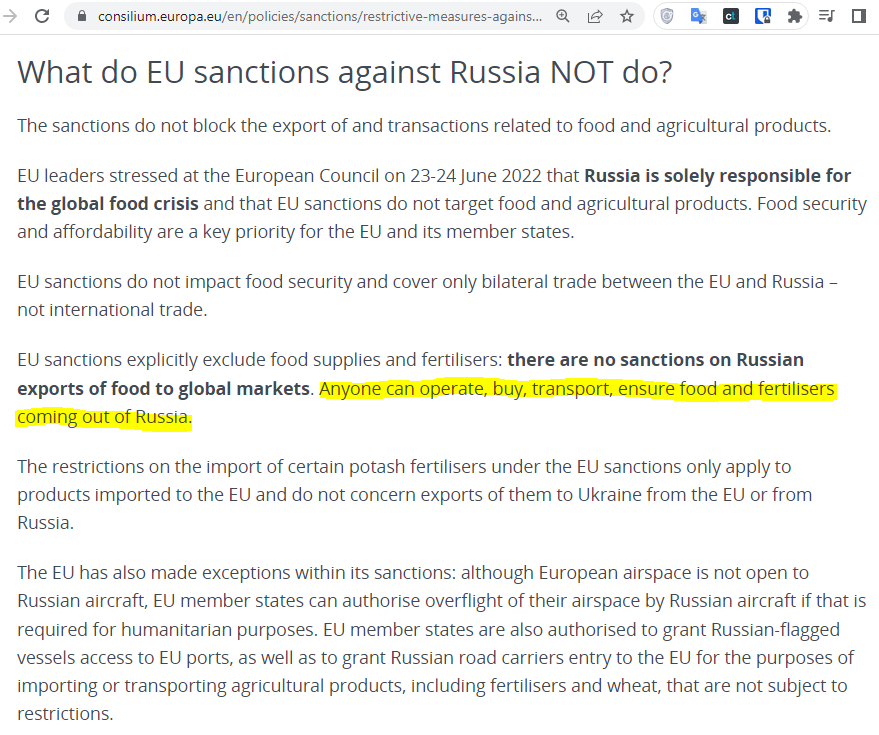
The explanation goes on to emphasize: “ EU member states are authorized to grant Russian-flagged vessels access to EU ports, as well as to allow Russian road carriers to enter the EU for the purpose of importing or transporting agricultural products, including fertilizers and wheat, that are not subject to sanctions .”
This proves that the premise on which the accusation of the Montenegrin newspaper was raised, that the import-export of fertilizers and wheat is not allowed with Russia due to the sanctions imposed by the EU, is incorrect.
Further facilitation of agricultural trade
In the 9th package of sanctions against Russia that the EU adopted on 16 December 2022, it was decided to allow special exemptions, assessed on a case-by-case basis, for a number of sanctioned individuals and entities that are significantly involved in the food trade.
The press statement of the High Representative for Foreign Affairs and Security Policy, Joseph Borell, emphasized that ‘none of the measures taken against Russia after the start of the war in Ukraine in any way targets agricultural trade and food products, including wheat and fertilizers. , between Russia and non-member countries in the European Union .
Despite this, in order to avoid interruption in the supply channels of agricultural products, it was decided to allow the unlocking of assets and allowing access to funds, of certain individuals who have an important role in the international trade of agricultural and livestock products, as well as food products including wheat and fertilizers.
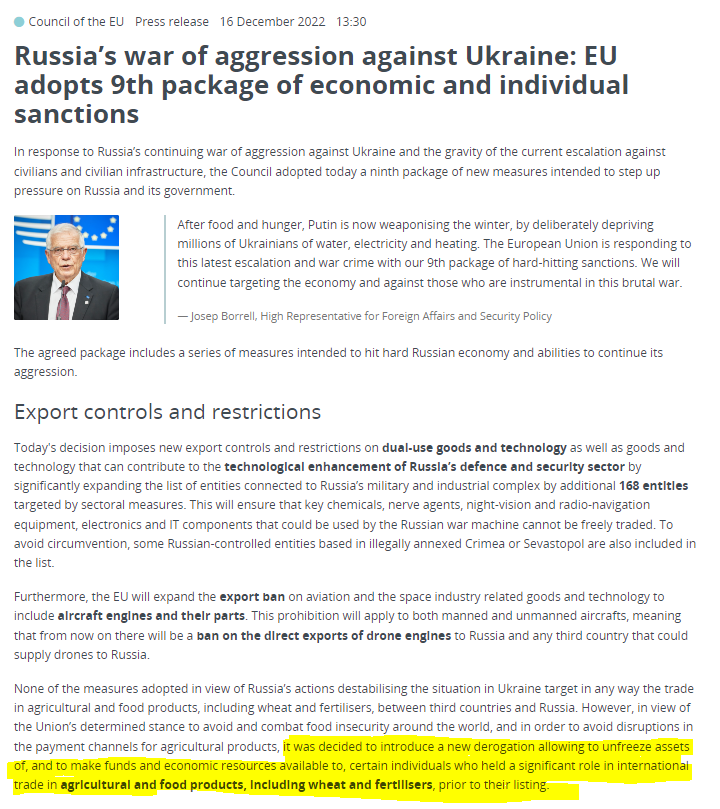
Check
Faktoje contacted the Montenegrin newspaper pobida.me to ask about the facts on which it based the claim made in the article. In the response received, the editorial office of the Montenegrin newspaper argues that it is about some specific types of artificial fertilizers, which contain potassium.
More precisely: according to the Decision of the European Union from April 8, 2022, the sale of certain artificial fertilizers from Russia is not allowed: potassium chloride (tariff number: 3105 20), mineral or chemical fertilizers containing nitrogen, phosphorus and potassium ( 3105 20), mineral or chemical fertilizers containing phosphorus and potassium (3105 60) and all other fertilizers containing potassium chloride (3105 90 20). “- writes journalist Drasko Đuranović in his reply.
Although this information is not specified in the article published on December 16, Faktoje verified that the sanctions imposed by the EU on April 8 against Russia include the above-mentioned products as prohibited to be purchased, imported or transported directly. or indirectly, as goods that generate huge revenues for Russia, allowing it to finance its destabilizing actions in Ukraine.


Despite this prediction, the decision of the European Commission also provided for two facilities related to these products.
Point 3 of Article 3i in the decision (CFSP) 2022/578 states that the prohibition of these products will not be applied until July 10, 2022 for contracts concluded before the date of this decision, or new contracts that are needed for the execution of these contracts existing.
At the same time, point 4 of this EU decision provides that from July 10, 2022, the ban on Annex XXI products, which includes the fertilizers listed above, will not apply to import, purchase, transport or assistance provision technical and financial necessary for the import into the Union of:
- 837,570 metric tons of potassium chloride with CN code 3104 20 between July 10 of a given year and July 9 of the following year;
- 1 577 807 combined metric tonnes of other products listed in Annex XXI under CN codes 3105 20, 3105 60 and 3105 90 between 10 July of a given year and 9 July of the following year;
Apparently, the product codes that are allowed to be imported up to a certain quota into the EU are those of the artificial fertilizers listed above.
Conclusion
The article published by the Montenegrin newspaper “Pobjeda” makes serious accusations against three states of the region, based on unsubstantiated information. The Montenegrin newspaper article misinforms readers by providing only general information, without explaining what the banned product is.
Albania, Serbia and Montenegro have the right to continue trading with the Russian Federation for agricultural products such as wheat and fertilizers. Sanctions imposed by the European Union only prohibit the trade of certain specific fertilizers. Even this blockade is accompanied by certain quotas, allowed to be imported and traded with Russia.
The claim raised by the Montenegrin newspaper, repeated by the Albanian opposition and multiplied by the media, remains unsubstantiated. This is because the newspaper does not provide any evidence to prove that these three countries have allowed the trade of prohibited products.
*This article was produced as part of the regional initiative Western Balkans Center Against Disinformation






